Five International Potato Center (CIP) early career researchers have been named finalists in the 2017 CGIAR Norman E. Borlaug Fellowship Program. Anne Njoroge, Daniel Mbogo, Eric Kuuna Dery, Kwame Ogero — from sub Saharan Africa—and Betty Flores based in Lima, Peru received the news from the United States Department of Agriculture (USDA) office of capacity building and development. The next stage entails identification of appropriate host institutions and mentors to support their research, a process that can take up to three months. Final outcomes will be communicated by 31 August 2017. CIP scientists Jan Kreuze and Hannele Lindqvist-Kreuze steered the application process working closely with the CIP applicants.
“We are so proud of each one of you for the excellent work you do. I am sure this recognition is an early sign of greater things to come,” said Dr. Adiel Mbabu, CIP-sub Saharan Africa (SSA) Regional Director while congratulating finalists.
Anne Njoroge
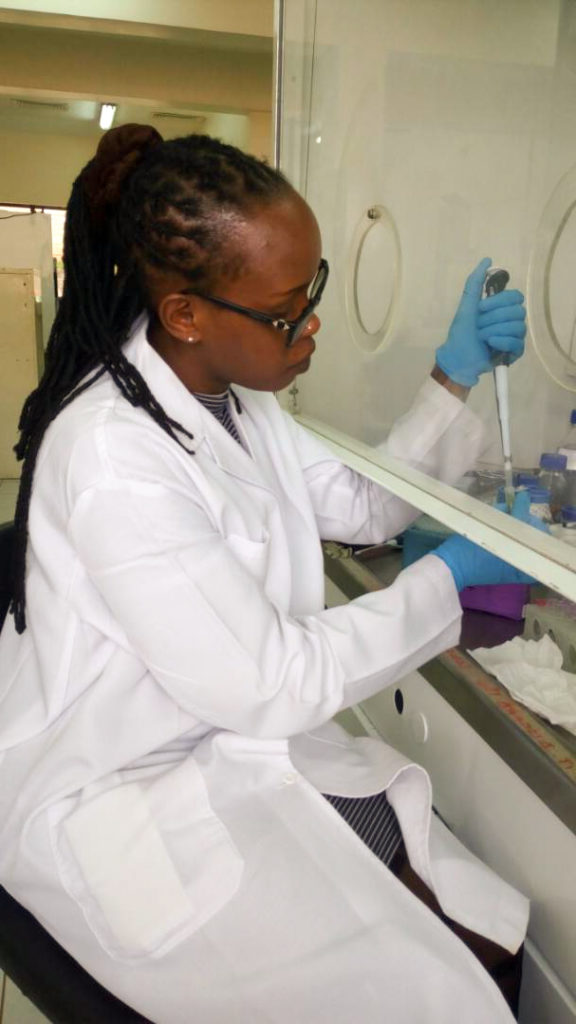 Anne is based in Kenya and is part of the late blight research group at CIP. She is a pathologist by training and uses molecular-based techniques to study late blight disease. Her current focus is understanding population dynamics and host-pathogen interactions of Phytophthora infestans in the Eastern Africa region.
Anne is based in Kenya and is part of the late blight research group at CIP. She is a pathologist by training and uses molecular-based techniques to study late blight disease. Her current focus is understanding population dynamics and host-pathogen interactions of Phytophthora infestans in the Eastern Africa region.
For this fellowship, Anne seeks to compare the genes expressed during the interaction of the P. infestans (potato, tomato) as a way of understanding why host-specialization of the US-1 clonal genotype still exists in Eastern Africa. Her research topic is: Effector gene expression in the US-1 clonal genotypes of Phytophthora infestans on potato and tomato using RNAseq analysis.
Anne notes “the CGIAR-Borlaug fellowship is a recognition of my resolve to venture into an area of research that has not been studied and that will answer crucial questions for researchers working on potato and tomato late blight. This huge opportunity awarded to me by USDA will give me a chance to carry out my research under the supervision and personal interaction with an expert. My career at CIP has been specifically focusing on late blight disease of potato and tomato. I have generated findings for the Eastern Africa region over the years which have been used regionally and globally to understand the dynamics of the late blight pathogen, Phytophthora infestans, in our region. Recently, I have been able to validate protocols at the Biosciences eastern and central Africa (BecA-ILRI) hub which can be used by other African scientists working on late blight. This was possible by endeavouring to recreate some of the research that I have previously undertaken in Europe (Sweden) and the USA (North Carolina State University). The work at the BecA-ILRI hub is funded through the African Biosciences Challenge Fellowship (ABCF) which was awarded to me in September 2016 for one year. Outcomes from the CGIAR-Borlaug fellowship will enrich the late blight research findings already present for the region and will be part of the proposed AfricaBlight network.”
Eric Dery
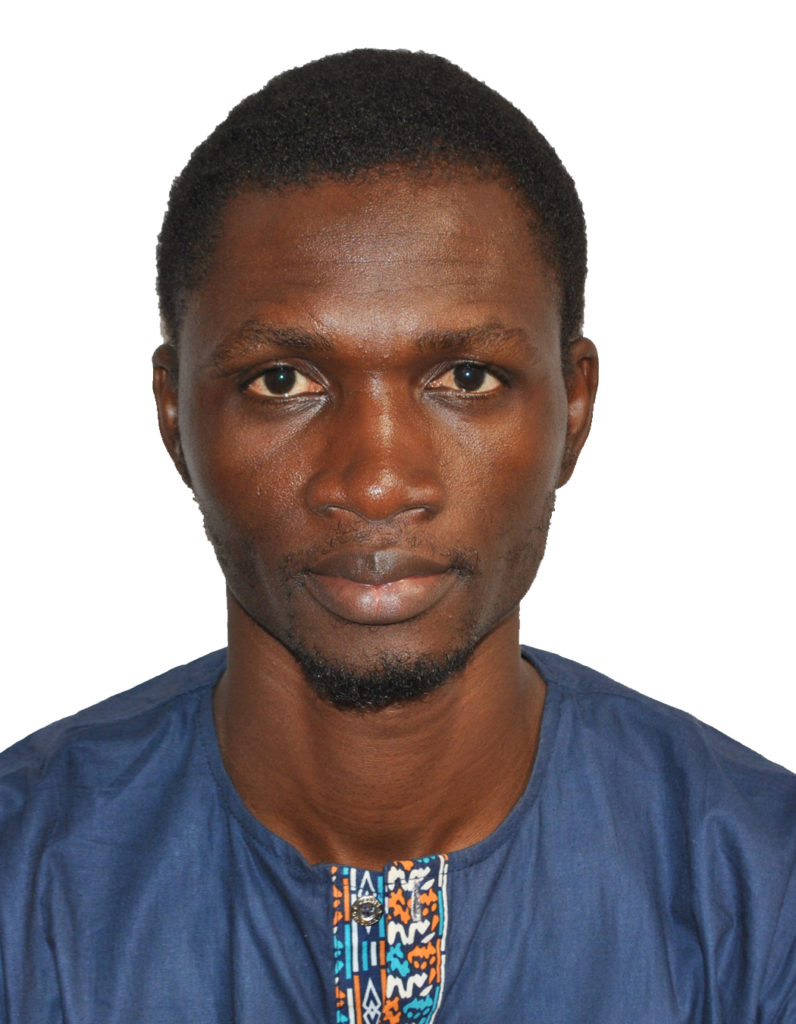 Based in Ghana, Eric Kuuna Dery, has been a Research Officer under the Jumpstarting Orange- Fleshed Sweetpotato through diversified markets project. As a Borlaug fellow, he seeks to understand Ghanaian and West African consumer preferences for sweetpotato in order to target sweetpotato breeding efforts.
Based in Ghana, Eric Kuuna Dery, has been a Research Officer under the Jumpstarting Orange- Fleshed Sweetpotato through diversified markets project. As a Borlaug fellow, he seeks to understand Ghanaian and West African consumer preferences for sweetpotato in order to target sweetpotato breeding efforts.
To Eric, getting this award means:
“I will be able to assist CIP in determining whether consumers in Ghana prefer sweet or less sweet sweetpotatoes which will facilitate breeding efforts in Ghana. This is not just victory for me alone but for the entire CIP fraternity, which is a center for excellence and career development. It shows the great work that CIP is doing across the globe in ensuring food security and providing for the vulnerable in society. This award is going to help CIP in further achieving its goal of alleviating poverty and food insecurity in sub-Saharan Africa through nutritious sweet potatoes. Successful completion of this research will provide a breakthrough for sweetpotato in Ghanaian household dieting system leading to increased adoption. I want to thank the USDA for offering us such an important opportunity to develop our careers and help the needy. Another heartfelt gratitude to CIP colleagues and partners such as Kwame Nkrumah University of Science and Technology (KNUST) Ghana for giving me the opportunity to pursue my PhD program.”
Daniel Mbogo
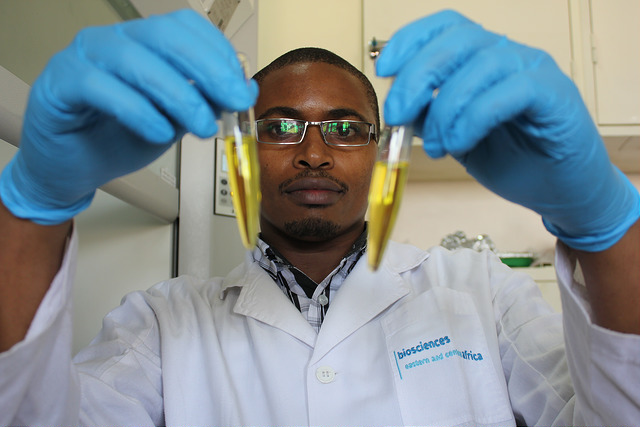 Daniel, a Research Associate works with the Food and Nutritional Evaluation Laboratory (FANEL) team at BecA-ILRI hub in Nairobi. Through the fellowship, he aims to estimate bioaccessibility and bioavailability of β-carotene in Orange-Fleshed Sweetpotato (OFSP) puree-wheat bakery products for SSA, through application of in vitro cell culture techniques. This work will strengthen FANEL’s capacity to generate evidence for nutrition not only for biofortified OFSP, but also for all Root, Tuber and Banana (RTB) crops and their derived products.
Daniel, a Research Associate works with the Food and Nutritional Evaluation Laboratory (FANEL) team at BecA-ILRI hub in Nairobi. Through the fellowship, he aims to estimate bioaccessibility and bioavailability of β-carotene in Orange-Fleshed Sweetpotato (OFSP) puree-wheat bakery products for SSA, through application of in vitro cell culture techniques. This work will strengthen FANEL’s capacity to generate evidence for nutrition not only for biofortified OFSP, but also for all Root, Tuber and Banana (RTB) crops and their derived products.
“I strongly believe that the program will actualize my professional training goals through the exposure to diverse American system offered in this fellowship. This will enrich my knowledge in specific areas of micronutrients bioavailability in staple foods, a gap I am keen on filling. Granted an opportunity to be a Borlaug fellow would mean having access to high quality and proven mentorship. I envision myself working as a post-harvest and nutrition expert in the next ten years and I believe that the Borlaug Fellowship will provide me the ideal environment to help me realize my dream. Knowledge gained will be invaluable upon return to my country.”
Kwame Ogero
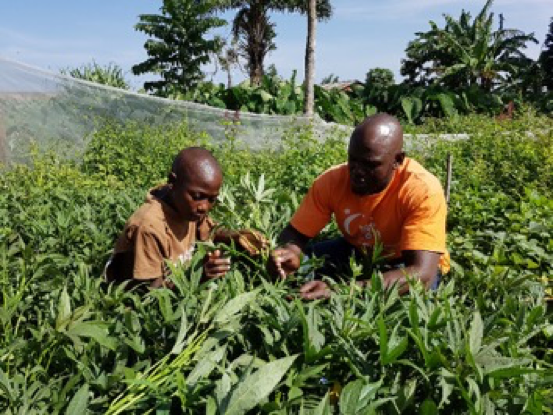 Kwame, a Regional Research Associate, based in Tanzania proposes to use the CGIAR Norman Borlaug Fellowship in understanding seed flow at the Lake Zone, Tanzania and its effect on quality of seed and spread of viruses. His research topic is: assessing biophysical and socio economic factors influencing farmer accessibility to quality sweetpotato seed at the Lake Zone, Tanzania.
Kwame, a Regional Research Associate, based in Tanzania proposes to use the CGIAR Norman Borlaug Fellowship in understanding seed flow at the Lake Zone, Tanzania and its effect on quality of seed and spread of viruses. His research topic is: assessing biophysical and socio economic factors influencing farmer accessibility to quality sweetpotato seed at the Lake Zone, Tanzania.
Kwame sees the fellowship as “an opportunity to expand knowledge on sweetpotato seed systems especially in deciding which technological and market interventions are suitable for who, where and when. Specifically, I would like to study how human activities and relationships influence seed movement and in turn, affect the epidemiology of sweetpotato viruses. Additionally, the opportunity will enable me to learn modeling techniques relevant in understanding epidemiology of crop pests and diseases under different climate change scenarios. Knowledge generated through this fellowship will help sweetpotato seed system practitioners understand stakeholder interactions within the seed system i.e. who is talking to who, why and how this can be improved to contribute towards a self-sustaining seed system. A better seed system will increase farmer access to quality planting material therefore reducing yield losses and contributing directly to improved food security and livelihoods.”
Betty Flores
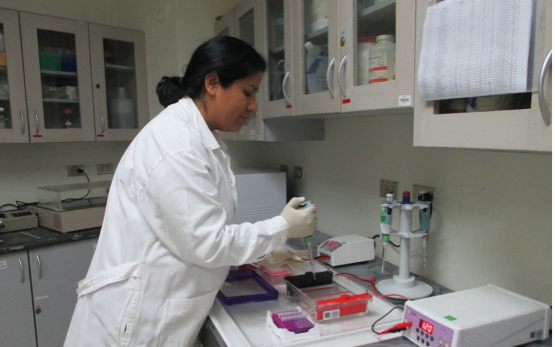 Based at the CIP headquarters in Lima, Peru, Betty is part of the research support unit where she has been working on virus diagnostics in potato and sweetpotato crops by serological and molecular techniques. For the Borlaug fellowship, she intends to contribute to the knowledge of diversity of Potato virus Y (PVY) and provide insights into its evolution using the next generation sequencing technology (NGS). Her research topic is genetic diversity of PVY strains infecting potato (Solanum spp.) in Perú.
Based at the CIP headquarters in Lima, Peru, Betty is part of the research support unit where she has been working on virus diagnostics in potato and sweetpotato crops by serological and molecular techniques. For the Borlaug fellowship, she intends to contribute to the knowledge of diversity of Potato virus Y (PVY) and provide insights into its evolution using the next generation sequencing technology (NGS). Her research topic is genetic diversity of PVY strains infecting potato (Solanum spp.) in Perú.
“I consider the Borlaug fellowship a huge opportunity to increase my skills as a researcher, and an excellent chance to establish ties of cooperation with other scientists and institutions whose common objective is to achieve an impact on reducing poverty and improving nutrition of the world’s poor. I am excited and grateful for the opportunity to acquire new knowledge, tools and techniques that will improve my work at CIP. With knowledge of the variability of the circulating species of PVY in Perú and the additional possibility of having highly reliable, sensitive and specific diagnostic methods, we can manage potato crops accordingly and contribute to the control of this virus,” she says.
About the Borlaug Fellowship
The Borlaug International Agricultural Science and Technology Fellowship Program promotes food security and economic growth by providing training and collaborative research opportunities to fellows from developing and middle-income countries. Borlaug fellows are generally scientists, researchers, or policymakers who are in the early or middle stages of their careers. Each fellow works one-on-one with a mentor at a U.S. university, research center or government agency, usually for 8-12 weeks. The U.S. mentor will later visit the fellow’s home institution to continue collaboration. Fellows may also attend professional conferences and events within their field, such as the annual World Food Prize Symposium. Learn more: https://www.fas.usda.gov/programs/borlaug-fellowship-program
Congratulations to the CIP-Borlaug Fellows!
Report by Vivian Atakos-Communications Specialist for CIP-SSA.
